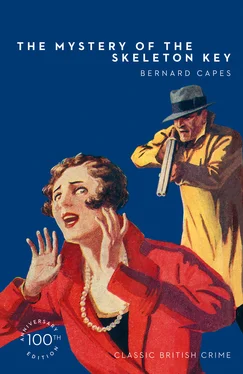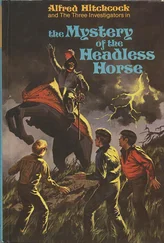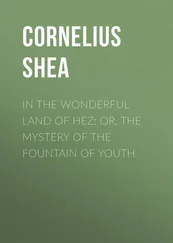His widow organised a plaque for him in Winchester Cathedral, among the likes of Izaak Walton and Jane Austen. It can still be seen, next to the entrance to the crypt.
Capes wrote historical adventures and romances, mystery novels, crime stories and many fine short stories, a lot of them dark and sinister tales (he was quite fond of werewolves). As a great fan of Wagner, he wrote a novel, The Romance of Lohengrin , published in 1905. At his memorial service in the cathedral in 1919, the organist played Wagner in his honour.
Published shortly after Capes’ death, complete with a hastily commissioned introduction by G. K. Chesterton that added to its notoriety, The Skeleton Key had already been reissued six times when, ten years later, Sir Godfrey Collins launched the company’s first dedicated crime imprint, The Detective Story Club—‘for detective connoisseurs’—a mixture of genre classics and cheap reprints. It was only natural that Capes’ book should be one of the launch titles for the new list, and so in July 1929 it appeared in its eighth edition alongside five other titles, priced only sixpence, with a dramatic jacket painting and an extended title intended to increase further the book’s popularity: The Mystery of the Skeleton Key .
By 1930, the ‘Golden Age’ of crime fiction was well underway, and Bernard Capes’ novel began to disappear as more and more inventive detective stories appeared on the market. In his 1972 book, Bloody Murder , Julian Symons called The Skeleton Key ‘a neglected tour de force ’, but it’s only now, more than 40 years later, that Capes’ landmark novel has found its way back into print.
The story introduces the detective Baron Le Sage, who unravels a rather complicated murder. Le Sage is in the line of Robert Barr’s detective Eugene Valmont (who had appeared in 1906), and Agatha Christie’s Hercule Poirot (who was yet to be created), with a touch of Dr Fell, and is one of Capes’ most interesting creations. As one character remarks, ‘Chess is the Baron’s business.’ He might have appeared again if Capes had survived longer. It’s good to see him, and Bernard Capes, back at work again.
HUGH LAMB
February 2015
MRS BERNARD CAPES wishes to express her gratitude to Mr Chesterton for his appreciative introduction to her husband’s last work, and to Mr A. K. Cook for his invaluable assistance in preparing it for the press.
Winchester
To introduce the last book by the late Bernard Capes is a sad sort of honour in more ways than one; for not only was his death untimely and unexpected, but he had a mind of that fertile type which must always leave behind it, with the finished life, a sense of unfinished labour. From the first his prose had a strong element of poetry, which an appreciative reader could feel even more, perhaps, when it refined a frankly modern and even melodramatic theme, like that of this mystery story, than when it gave dignity, as in Our Lady of Darkness , to more tragic or more historic things. It may seem a paradox to say that he was insufficiently appreciated because he did popular things well. But it is true to say that he always gave a touch of distinction to a detective story or a tale of adventure; and so gave it where it was not valued, because it was not expected. In a sense, in this department of his work at least, he carried on the tradition of the artistic conscience of Stevenson; the technical liberality of writing a penny-dreadful so as to make it worth a pound. In his short stories, as in his historical studies, he did indeed permit himself to be poetic in a more direct and serious fashion; but in his touch upon such tales as this the same truth may be traced. It is a good general rule that a poet can be known not only in his poems, but in the very titles of his poems. In the case of many works of Bernard Capes, The Lake of Wine , for instance, the title is itself a poem. And that case would alone illustrate what I mean about a certain transforming individual magic, with which he touched the mere melodrama of mere modernity. Numberless novels of crime have been concerned with a lost or stolen jewel; and The Lake of Wine was merely the name of a ruby. Yet even the name is original, exactly in the detail that is hardly ever original. Hundreds of such precious stones have been scattered through sensational fiction; and hundreds of them have been called ‘The Sun of the Sultan’ or ‘The Eye of Vishnu’ or ‘The Star of Bengal’. But even in such a trifle as the choice of the title, an indescribable and individual fancy is felt; a sub-conscious dream of some sea like a sunset, red as blood and intoxicant as wine. This is but a small example; but the same element clings, as if unconsciously, to the course of the same story. Many another eighteenth century hero has ridden on a long road to a lonely house; but Bernard Capes, by something fine and personal in the treatment, does succeed in suggesting that at least along that particular road, to that particular house, no man had ever ridden before. We might put this truth flippantly, and therefore falsely, by saying he put superior work into inferior works. I should not admit the distinction; for I deny that there is necessarily anything inferior in sensationalism, when it can really awaken sensations. But the truer way of stating it would perhaps be this; that to a type of work which generally is, for him or anybody else, a work of invention, he always added at least one touch of imagination
The detective or mystery tale, in which this last book is an experiment, involves in itself a problem for the artist, as odd as any of the problems which it puts to the policeman. A detective story might well be in a special sense a spiritual tragedy; since it is a story in which even the moral sympathies may be in doubt. A police romance is almost the only romance in which the hero may turn out to be the villain, or the villain to be the hero. We know that Mr Osbaldistone’s business has not been betrayed by his son Frank, though possibly by his nephew Rashleigh. We are quite sure that Colonel Newcome’s company has not been conspired against by his son Clive, though possibly by his nephew Barnes. But there is a stage in a story like The Moonstone , when we are meant to suspect Franklin Blake the hero, as he is suspected by Rachel Verinder the heroine; there is a stage in Mr Bentley’s Trent’s Last Case when the figure of Mr Marlowe is as sinister as the figure of Mr Manderson. The obvious result of this technical trick is to make it impossible, or at least unfair, to comment, not only on the plot, but even on the characters; since each of the characters should be an unknown quantity. The Italians say that translation is treason; and here at least is a case where criticism is treason. I have too great a love or lust for the roman policier to spoil sport in so unsportsmanlike a fashion; but I cannot forbear to comment on the ingenious inspiration by which in this story, one of the characters contrives to remain really an unknown quantity, by a trick of verbal evasion, which he himself defends, half convincingly, as a scruple of verbal veracity. That is the quality of Bernard Capes’ romances that remains in my own memory; a quality, as it were, too subtle for its own subject. Men may well go back to find the poems thus embedded in his prose.
G. K. CHESTERTON
CHAPTER I
MY FIRST MEETING WITH THE BARON
( From the late Mr Bickerdike’s ‘Apologia’, found in manuscript )
SOME few years ago, in the month of September, I happened to be kicking my heels in Paris, awaiting the arrival there of my friend Hugo Kennett. We had both been due from the south, I from Vaucluse and Kennett from the Riviera, and the arrangement had been that we should meet together for a week in the capital before returning home. Enfants perdus! Kennett was never anything but unpunctual, and he failed to turn up to time, or anywhere near it, at the rendezvous. I was a trifle hipped, as I had come to the end of my circular notes, and had rather looked to him to help me through with a passing difficulty; but there was nothing for it but to wait philosophically on, and to get, pending his appearance, what enjoyment I could out of life. It was not very much. The Parisian may be a saving man, but Paris is no city to save in. It is surprising how dull an empty purse can make it. It had come to this after two days, either that I must shift my quarters from the Ritz into cheaper lodgings, or abandon my engagement altogether and go back alone.
Читать дальше












